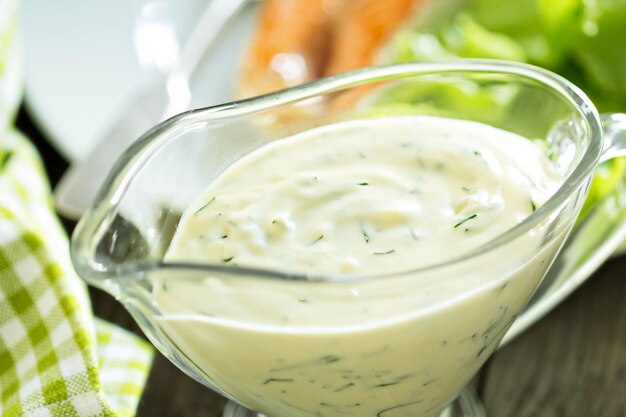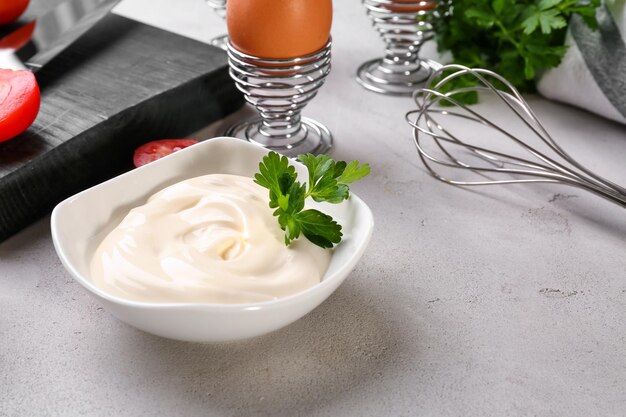Mayonnaise is a staple condiment found in households across the United States. Its creamy texture and tangy flavor make it a favorite addition to sandwiches, salads, and dips. However, as delicious as it may be, many people wonder, “Is mayonnaise healthy?” This article explores the nutritional profile of mayonnaise and its potential impact on your health. By the end, you’ll have a clear understanding of whether mayonnaise can fit into a healthy diet.
Nutritional Profile of Mayonnaise
Understanding mayonnaise’s nutritional makeup is key to evaluating its health effects. It’s not just about calories; the ingredients tell a more comprehensive story.
Caloric Content
Mayonnaise is calorie-dense. Just one tablespoon contains approximately 90-100 calories, making it easy to overconsume without realizing. These calories primarily come from fats, which can add up quickly in recipes or as a spread. For those monitoring calorie intake, portion control is essential.
Fat Composition
Mayonnaise is primarily composed of fats. These include:
- Saturated Fats: A tablespoon contains about 1.5 grams of saturated fat. Consuming too much saturated fat is associated with an increased risk of heart disease.
- Trans Fats: Some commercial varieties may contain small amounts of trans fats, which are harmful and can raise bad cholesterol (LDL) levels.
- Unsaturated Fats: On a positive note, mayonnaise also contains unsaturated fats, which are considered heart-healthy when consumed in moderation.
Additional Ingredients
Store-bought mayonnaise often contains additives like sugar, sodium, and preservatives to enhance flavor and shelf life. These additives can impact health in the following ways:
- Sugar: Adds unnecessary calories and contributes to weight gain.
- Sodium: Excess sodium intake can raise blood pressure.
- Preservatives: While generally recognized as safe, some individuals may be sensitive to certain preservatives like EDTA.
Health Implications of Mayonnaise Consumption
While mayonnaise can be part of a balanced diet, overindulgence has potential drawbacks.
Weight Gain and Obesity
Mayonnaise’s high-calorie and fat content make it a contributor to weight gain if consumed in large amounts. Repeatedly adding it to meals without considering portion sizes can lead to a calorie surplus, resulting in obesity over time. Individuals focused on weight management should consider low-fat or light mayonnaise as alternatives.
Heart Health
Saturated and trans fats in mayonnaise can negatively impact heart health.
- Cholesterol Levels: High intake of saturated fats may increase LDL cholesterol, leading to plaque buildup in arteries.
- Heart Disease Risk: Excessive consumption of unhealthy fats raises the risk of heart disease, especially for those already at risk due to genetics or lifestyle factors.
Replacing traditional mayonnaise with versions made from olive or avocado oil may be a heart-healthier choice.
Risk of Foodborne Illnesses
Mayonnaise made with raw eggs poses a risk of foodborne illnesses, particularly Salmonella. Commercial mayonnaise typically uses pasteurized eggs to minimize this risk. However, homemade mayonnaise must be handled carefully to avoid contamination. Refrigeration and consuming it within a few days are essential for safety.
Related to Read: Does Ranch Dressing Have Carbs? An In-Depth Look
Mayonnaise and Dietary Considerations
For individuals following specific diets or managing chronic conditions, mayonnaise may pose additional challenges.

Sodium Intake
Store-bought mayonnaise contains significant amounts of sodium, contributing to daily intake. Excessive sodium can:
- Increase blood pressure.
- Strain the cardiovascular system over time.
For those monitoring sodium levels, choosing low-sodium options or making mayonnaise at home can help reduce this impact.
Added Sugars
Some mayonnaise brands include hidden sugars to balance flavors. While the sugar content per serving is small, it can add up over time.
- Diabetes Risk: Excess sugar intake contributes to insulin resistance and type 2 diabetes.
- Weight Management: Even small amounts of added sugar can contribute to weight gain when consumed frequently.
Reading labels carefully or opting for sugar-free mayonnaise varieties can mitigate these concerns.
Healthier Alternatives to Traditional Mayonnaise
While traditional mayonnaise has its appeal, healthier options can provide similar flavor and creaminess without as many calories, unhealthy fats, or additives.
Homemade Mayonnaise
Making mayonnaise at home allows you to control the ingredients, ensuring a healthier result. Here’s a simple recipe:
Ingredients:
- 1 large egg (pasteurized if preferred).
- 1 cup of olive oil or avocado oil (heart-healthy options).
- 1 tablespoon lemon juice or apple cider vinegar.
- ½ teaspoon Dijon mustard.
- A pinch of salt.
Instructions:
- In a mixing bowl, whisk the egg, lemon juice, mustard, and salt until combined.
- Slowly drizzle in the oil while continuously whisking (or use an immersion blender for ease).
- Blend until thick and creamy. Adjust seasoning to taste.
This version is rich in unsaturated fats, free from additives, and lower in sodium than most store-bought varieties.
Alternative Spreads
If you’re looking for substitutes, there are plenty of options that deliver flavor and health benefits:
- Hummus: Made from chickpeas and tahini, hummus is rich in fiber and protein.
- Greek Yogurt-Based Dressings: These are creamy but lower in fat and calories, offering a dose of probiotics.
- Mustard: A low-calorie option packed with flavor.
- Avocado Spread: Provides healthy monounsaturated fats and a creamy texture.
These alternatives are versatile, nutritious, and cater to a variety of dietary preferences.
Tips for Healthier Mayonnaise Consumption
Enjoying mayonnaise responsibly is all about moderation and making informed choices. Here’s how:

Portion Control
A single tablespoon of mayonnaise contains around 90-100 calories. To avoid overconsumption:
- Use a teaspoon instead of a tablespoon as a serving.
- Spread it thinly on sandwiches or dilute it with Greek yogurt in recipes.
- Opt for smaller amounts in salads or dips and pair with lighter ingredients like fresh vegetables.
Reading Labels
Not all mayonnaise brands are created equal. Choosing wisely can make a big difference:
- Look for “light” mayonnaise with fewer calories and reduced fat.
- Check for no trans fats and minimal saturated fat.
- Prioritize brands with natural ingredients and no unnecessary additives like sugar or artificial preservatives.
Storage and Handling
Proper storage ensures safety and maintains the quality of mayonnaise:
- Refrigeration: Always store mayonnaise in the refrigerator, even if it’s unopened.
- Shelf Life: Discard mayonnaise past its expiration date or if it shows signs of spoilage (e.g., off smell or texture changes).
- Homemade Mayonnaise: Use within 3-5 days and keep it chilled to minimize bacterial contamination risks.
Related to Read: Does Ketchup Have Sugar?: A Comprehensive Guide
Conclusion
Mayonnaise can be part of a healthy diet when consumed in moderation. Understanding its nutritional profile and making smart choices—like opting for homemade versions or healthier alternatives—can significantly reduce its potential health risks. Additionally, portion control and proper storage are key to enjoying this condiment safely.
By being informed and selective, you can enjoy mayonnaise without compromising your health.
FAQs
1. What are the healthiest store-bought mayonnaise options?
Look for light or low-fat mayonnaise brands that use olive or avocado oil as the base. These options are typically lower in saturated fats and calories.
2. How long does homemade mayonnaise last?
Homemade mayonnaise should be stored in the refrigerator and consumed within 3-5 days to avoid bacterial contamination.
3. Can I use mayonnaise on a keto diet?
Yes, mayonnaise is low in carbohydrates, making it a suitable option for keto diets. Choose versions with healthy fats and minimal additives.
4. What’s the main difference between light mayonnaise and regular mayonnaise?
Light mayonnaise contains fewer calories and less fat. It’s often made with added water or starches to achieve a similar texture.
5. Is vegan mayonnaise a good alternative?
Vegan mayonnaise is a great substitute for those avoiding eggs or dairy. It’s typically made from plant-based oils and ingredients like soy or aquafaba (chickpea water).

